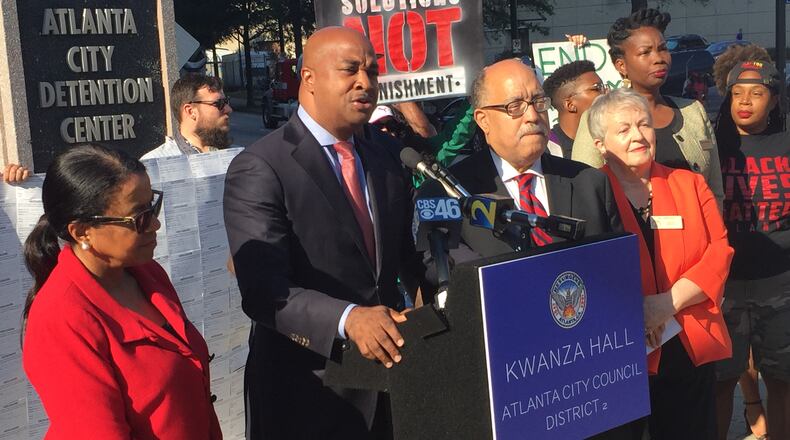Supporters of Atlanta City Council legislation to reduce fines and eliminate jail time for possession of small amounts of marijuana rallied Friday in hopes of putting pressure on leaders to approve the initiative on Monday.
More than 50 supporters of Atlanta City Councilman Kwanza Hall's legislation gathered at the Atlanta Detention Center to decry marijuana possession laws that they say are used mostly to incarcerate African Americans.
“While blacks and whites use marijuana at the same rates in the country, these laws disproportionately fall on African Americans,” said Andrea Young, executive director of the American Civil Liberties Union of Georgia and daughter of civil rights icon Andrew Young.
“We’re spending billions of dollars in racially discriminatory law enforcement,” she said, “(and) taking away law enforcement resources that could actually be spent to keep our communities safe.”
Between 2014 and 2016, 92 percent of those arrested for possession were African American and 85 percent were male, according to the Racial Justice Action Center in East Point.
The Atlanta City Council is expected to vote on Hall's legislation on Monday. Hall, who is running for mayor of Atlanta, is seeking to reduce the penalty for possession of an ounce or less of marijuana from the current $1,000 fine to a ticket of $75. Jail time would be eliminated under the proposal for possession of an ounce or less instead of the up to six months under current guidelines.
This is the second time Hall has sought Council approval of the new guidelines. The proposal stalled last spring after questions were raised about buy-in from the Atlanta Police Department and the city's judicial branchas well as concerns it could send the wrong signal to marijuana users.
Hall and others said arrests for small amounts of marijuana have a detrimental impact on citizens, including job loss, inability to rent an apartment and denial of applications to some universities.
“This jail and other jails are the gateway to a life of crime and it ruins people’s lives,” Hall said. “And we can do better as a city.”
About the Author
Keep Reading
The Latest
Featured

